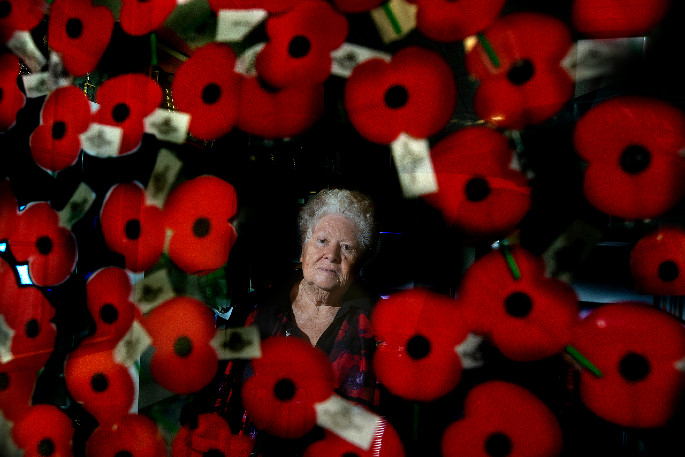Tauranga's ‘Poppy Lady' Veronica Egan has been organising the Tauranga RSA's annual Poppy Day appeal since 1985.
This year, the RSA has chosen to highlight the experiences of women and the military.
'I joined the women's section of the RSA in 1983 and was just a member,” says Veronica.
'Before very long, I found I was on the committee.”
Her first Poppy Day came along and she quickly found she was able to assist with anything needed.
'I was helping with the catering and the women's section. Then the lady who was in charge passed away. I had worked with her, so I ended up being the ‘Poppy Lady' - that's what they called me.”
To be the Poppy Lady requires liaising with people and plenty of planning. It's a big job, with Sonia Peebles and RSA welfare committee chairperson Tony Hulme assisting her.
'You ring around people and businesses, to see if they're interested in helping us by selling poppies or putting the buckets on their reception desks so people can buy a poppy.”
Her team deliver the poppies to schools, businesses and rest homes.
'And Tauranga grows so that means there's a bit more each year.”
The RSA Poppy has truly become a national icon.
Poppy Day is usually held on the Friday before Anzac Day, the national day of remembrance commemorating all Australians and New Zealanders who served and died in all wars, conflicts and peacekeeping operations, and also commemorates the first landing of the Anzacs at Gallipoli.
This year, Poppy Day is being held a week earlier, in order to ensure that funds are raised in time ahead of Anzac Day.
The RSA Poppy Appeal is New Zealand's longest running charity appeal with more than 80 years of history. First conducted in 1922, the Poppy Appeal was held to fund welfare and support services for veterans of the First World War.
French woman Madame E. Guérin conceived the idea of widows manufacturing artificial poppies in the devastated areas of Northern France which then could be sold by veterans' organisations worldwide for their own veterans and dependants as well as the benefit of destitute French children.
In 1931, the NZRSA started producing its own poppies, made by disabled returned men at Auckland and Christchurch RSA.
Poppy Day was cancelled last year because New Zealand was in Alert Level 4 lockdown, and Veronica had to store Tauranga's boxes of poppies for a year.
The appeal typically raises between $1 million and $2 million annually which enables the RSA, New Zealand's largest veteran's charity, to make welfare grants to assist its more than 102,000 members.
During this years' appeal, hardworking RSA volunteers will be exchanging distinctive red poppies for a donation to the Poppy Appeal.
'We have volunteers sitting at all the supermarkets,” says Veronica. 'And the Lions Clubs come on board and help too, walking around the streets with the poppies.”
As well as Tauranga, Poppy Day appeals will be held on Friday, April 16, in Katikati, Te Puke and Mount Maunganui.



1 comment
Really
Posted on 18-04-2021 16:51 | By Kancho
I doubt very much that the 102,000 are veterans that require assistance from a welfare fund. I would say the national membership of the RSA maybe with mostly associate club members not a services people. ? I see from two articles the granddaughter of the Tauranga Welfare Trust is getting her team togged out with uniforms . I also note a young man in another article being funded to go on outward bound course again fro welfare funds. Suppose it's out there that poppy day collection goes into a great big fund for these things too. I understand the government veterans affairs dept looks after a lot of the veterans needs so what's the real story ? Who are we supporting when buying poppies
Leave a Comment
You must be logged in to make a comment.